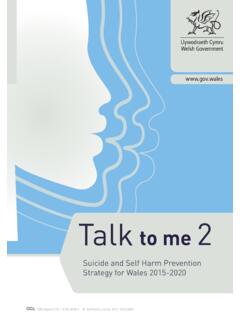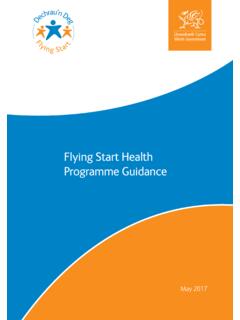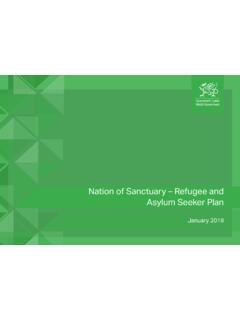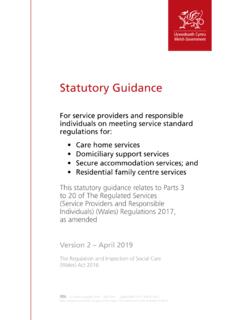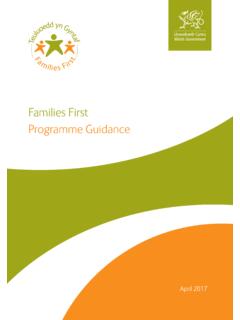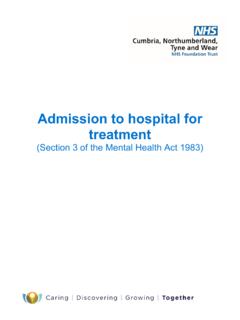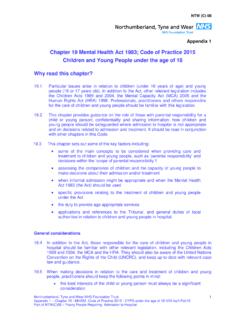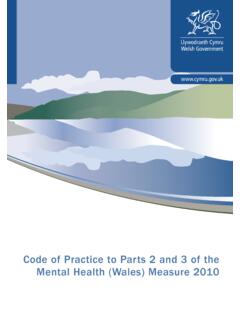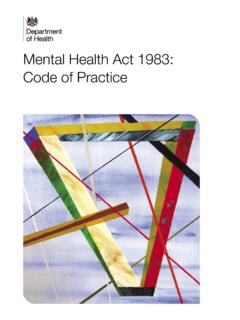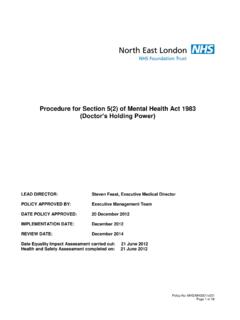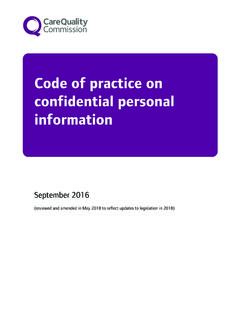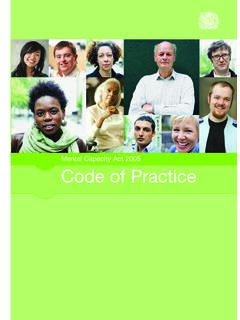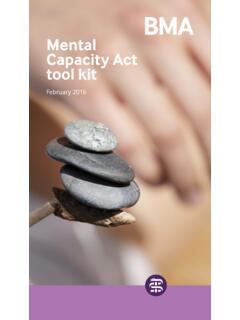Transcription of Mental Health Act 1983 Code of Practice for Wales
1 code of PracticeMental Health Act 1983for Wales Review Crown copyright 2016 WG29375 Digital ISBN 978-1-4734-7176-4 Print ISBN 978-1-4734-7177-1 Mae r ddogfen yma hefyd ar gael yn document is also available in Welsh. Revised 2016 Contents Foreword by the Cabinet Secretary for Health , Well-being and Sport 1 Introduction 3 1 Guiding Principles 8 2 Definition of Mental disorder 13 3 Human rights and reducing inequalities 15 4 Information for patients, nearest relatives, families, carers and others 17 5 Nearest relative 25 6 Independent Mental Health advocacy 30 7 Attorneys and deputies 40 8 Privacy, dignity and safety 42 9 Views expressed in advance 50 10 Confidentiality and information sharing 53 11 Visiting patients in hospital 57 12 The Mental Health Review Tribunal for Wales 61 13 Relationship between the Mental Health Act.
2 The Mental Capacity Act and the Deprivation of Liberty Safeguards 67 14 Applications for detention in hospital 75 15 Emergency applications for detention 93 16 Police powers and places of safety 95 17 Transport of patients 105 18 Holding powers 111 19 Children and young people under the age of 18 116 20 People with learning disabilities or autistic spectrum disorder 128 21 People with personality disorders 135 22 Patients concerned with criminal proceedings 138 23 Appropriate medical treatment 153 24 Medical treatment 156 25 Treatments subject to special rules and procedures 168 26 Safe and therapeutic responses to challenging behaviour 183 27 Leave of absence 193 28 Absence without leave 199 29 Community treatment orders 202 30 Guardianship 211 31 Leave of absence, a community treatment order or guardianship?
3 216 32 Renewals, extensions and discharge: detentions and community treatment orders 219 33 After-care 223 34 Care and treatment planning 226 35 Receipt and scrutiny of documents 233 36 Allocation or changing a responsible clinician 236 37 Duties of hospital managers 238 38 Hospital managers discharge power 245 39 Conflicts of interest 253 40 Information for victims 256 Annex 1 261 Annex 2 269 Key words and terms 274 Index 288 1 Foreword by the Cabinet Secretary for Health , Well-being and Sport This is the second Mental Health Act 1983 code of Practice for Wales (the code ). The code has been updated to reflect changes to the law and in particular the requirements of the Mental Health ( Wales ) Measure 2010, which aims to improve Mental Health provision for all those receiving Mental Health services in Wales .
4 The code is central to ensuring patients rights are both promoted and protected. It will support professionals to achieve that goal. Families, carers and relevant others are an essential part of that process. I would like to thank the many people who have been involved in the creation of the revised code . It has been patient, professional, family, carer and third sector voices that have shaped its content. Only by working together and listening to each others views can we improve care and treatment for all. The code s guiding principles will form the foundations of services that excel in the delivery of evidenced-based, effective and humane care and treatment. This code should ensure: patients are treated with dignity and respect and their views listened to, recorded, valued and taken into account patients families and carers are treated with dignity and respect and their views listened to, recorded, valued and taken into account patients are treated in a safe and supportive physical and cultural environment, that is appropriate for their specific needs patients are transported to and from hospital by the safest and most appropriate means patients, their families and carers are given relevant and accessible information and are informed of their rights patients, their families and carers are communicated with in a way that best meets their needs patients are treated with equity and equality patients in hospital have access to family and friends.
5 Can communicate with them in private; and, where appropriate, contact the people they choose through various means, without detriment to the privacy, safety and dignity of themselves or others staff have the training to undertake their role patients are enabled, as far as practicable, to contribute fully to their care and treatment plan, and make as many decisions as possible for themselves patients without capacity to make specific decisions are to be involved as much as possible in their care and treatment when decisions in the care and treatment plan are contrary to the wishes of the patient or others, the reasons are explained to them and recorded patients, their families and carers are to be informed of their rights and patients have access to an independent Mental Health advocate (IMHA).
6 2 The code clearly explains: how patients, their families, carers and others are to be kept as safe as possible how people in Mental Health crisis in public places are to be supported and kept safe in the most appropriate place of safety for the least amount of time that patients and, if appropriate, their families and carers are given the information they require to ensure they understand why they are in hospital and the treatment they are being offered or must have, and there are minimum restrictions on a patient s liberty and that discharge is facilitated as soon as possible. 3 Introduction i. The Mental Health Act 1983 code of Practice for Wales (the code ) has been prepared and is issued under section 118 of the Mental Health Act 1983 by the Welsh Ministers after consulting with such bodies as appear to the Welsh Ministers to be concerned, and being laid before the National Assembly for Wales .
7 The code will come into force on 3 October 2016. Presentation ii. Throughout the code , the Mental Health Act 1983 is referred to as the Act . iii. The Act sets out the legal framework, and the code provides the principles and guidance on how the Act should be applied in Practice . Connections between the Mental Health Act 1983 and other legislation, in particular the Mental Health ( Wales ) Measure 2010, are detailed where relevant. iv. The code assumes that readers are familiar with the main provisions of other legislation as they relate to the care and treatment of people with Mental disorder. v. The code generally uses the word patient , in line with the term used throughout the Act, though it is recognised some people prefer the terms service user , survivor , client , consumer and recipient.
8 The code uses the terms child and children for people aged under 18 years and young person when matters apply only to those aged 16-18 years. A list of key words and phrases used in the code is provided. vi. The code is available in both English and Welsh. Purpose and status of the code of Practice vii. The code provides guidance to particular individuals including registered medical practitioners ( doctors ), approved clinicians, managers and staff of hospitals, independent hospitals and care homes, independent Mental Health advocates and approved Mental Health professionals on how they should proceed when undertaking functions and duties under the Act. It also gives guidance to doctors and other professionals about certain aspects of medical treatment for Mental disorder more generally. viii.
9 These people are required to have regard to the code in carrying out their relevant functions under the Act. ix. The code is designed to support and promote good Practice amongst all those who are providing Mental Health services under the Act. x. The code applies to the care and treatment of all patients in Wales who are subject to the Act. This includes patients who are liable to be detained, subject to community treatment orders (CTOs) or those received into guardianship. xi. The Act applies to England and Wales . England has its own code of Practice that applies in England. 4 Statutory Guidance Who this applies to Context Registered medical practitioners ( doctors ) Approved clinicians, managers and staff of providers Approved Mental Health professionals (AMHPs) Independent Mental Health advocates (IMHAs) Given under section 118 of the Act in relation to the performance of their functions, including in relation to admission, guardianship and community patients Registered Medical Practitioners (doctors) and other professionals Given under section 118 of the Act in relation to the medical treatment of patients with a Mental disorder Local authorities and their staff Given under section 7 of the Local Authority Social Services Act 1970 (duty to exercise social services functions under guidance of the Welsh Ministers) xii.
10 The people listed above to whom the code is addressed must have regard to the code . It is important that these persons have training on the code and ensure that they are familiar with its requirements. It is guidance that should be given great weight and which any hospital should consider with care, and from which it should depart only if it has cogent reasons for doing so. Where the guidance addresses a matter covered by section 118(2) that is, a specified form of medical treatment, any departure would call for even stronger reasons. Beneficial but not statutory guidance Who this applies to Context The police Ambulance services Others in Health and social services (including the independent and voluntary sectors) involved in the commissioning or providing services to people who are, or may become, subject to compulsory measures under the Act The code is not statutory guidance, but it is beneficial to these persons in carrying out their duties and it is recommended they receive training on the code and ensure that they are familiar with its requirements.
